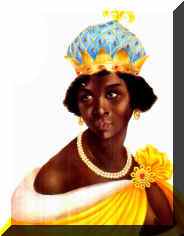|
In 1583 Anna Nzinga was born to King Kiluanji and her mother Kangela within the Ndongo and Matamba Kingdoms of Angola. She was given the name Nzinga which means to twist or turn, because she was born with her umbilical cord wrapped around her neck. Nzinga’s mother was foretold that Nzinga would become a wise and powerful queen in her future. Her father greatly enjoyed her presence and carried Nzinga everywhere he went. She was able to observe how her father governed the Kingdom; she also was able to accompany her father in war. Nzinga lived during the Atlantic slave trade and her land was being threatened by the Portuguese. One of Nzinga first displays of leadership and superior intelligence was when she accompanied her brother at a peace conference. They were attempting to persuade the Portuguese Governor Mendes de Vasconselos to withdraw the fortress of Ambaca from Ndongo land, return fellow countrymen who had been kidnapped and enslaved, and command the Imbangala mercenaries to cease their services. Nzinga was successful in her pursuits, all of her terms were agreed upon and a peace treaty was created. During the negoations the Portuguese Governor Correia de Sousa offered Nzinga a seat on a floor mat attempting to subordinate her. With royal grace Nzinga declined the floor mat then ordered one of her servants to get on the ground on all fours, and then Nzinga conducted the negations sitting on the back of her servant. The Queens actions showed the governor that she was not lower than he was. Nzinga would later convert to Christianity, it is said that she made the conversion to help strengthen her alliance with the Portuguese. Nzinga and her people would learn that the promises of the Portuguese were empty promises. They did not keep their word despite the negoations and the peace treaty. Cracking under the pressure of the Portuguese, Nzinga’s brother committed suicide and Nzinga became regent of her land because her brother’s son Kaza was too young to rule. In 1641 she aligned with the Dutch to help her fight the Portuguese. She gained a victory over the Portuguese in a battle at Ngoleme in 1644. In 1646 she would gain another victory in a battle at Kavanga. While gaining a victory one of her sisters was captured as well as records of her alliance with the Congo. Her sister was drowned by the Portuguese for her helping correspond with the Congo. Nzinga gained another victory over the Portuguese army with the help of Dutch reinforcements, her next step as to take the Portuguese capital of Masangano. The Portuguese was able to recapture the city of Luanda from the Dutch, which caused Nzinga to retreat to Matamba and continue her resistance from there. Nzinga was able to fight off the Portuguese from capturing her land until she reached her sixties. In 1657 she signed another peace treaty with the Portuguese, after the wars she began to rebuild her nation from years of battle. On December 17th, 1663 Queen Nzinga died at the age of eighty, leaving behind a kingdom weary from battle. After her passing the Portuguese over ran her kingdom eventually taking them over as part of the slave trade. Queen Nzinga was the definition of Beauty, class, wisdom, royalty, courage and leadership. She was able to hold off a superior army and maintain the freedom of her people and their culture. Queen Nzinga gave the Portuguese more than they bargained for, as well as set an example of the power of a woman. Queen Anna Nzinga, we stand on your shoulders. J.A. Ward. Click below to view the Queen Anna Nzinga video
0 Comments
Leave a Reply. |
Details
Categories
All
Click Here to join our mailing list
|
Contact Us: |
Connect With Us |
Site powered by PIT Web Design


 RSS Feed
RSS Feed



